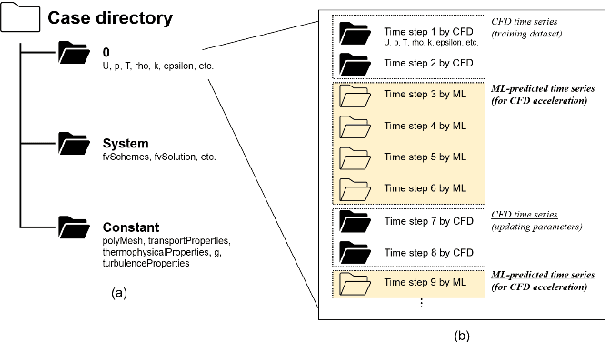Joongoo Jeon
Engineering application of physics-informed neural networks for Saint-Venant torsion
May 18, 2025Abstract:The Saint-Venant torsion theory is a classical theory for analyzing the torsional behavior of structural components, and it remains critically important in modern computational design workflows. Conventional numerical methods, including the finite element method (FEM), typically rely on mesh-based approaches to obtain approximate solutions. However, these methods often require complex and computationally intensive techniques to overcome the limitations of approximation, leading to significant increases in computational cost. The objective of this study is to develop a series of novel numerical methods based on physics-informed neural networks (PINN) for solving the Saint-Venant torsion equations. Utilizing the expressive power and the automatic differentiation capability of neural networks, the PINN can solve partial differential equations (PDEs) along with boundary conditions without the need for intricate computational techniques. First, a PINN solver was developed to compute the torsional constant for bars with arbitrary cross-sectional geometries. This was followed by the development of a solver capable of handling cases with sharp geometric transitions; variable-scaling PINN (VS-PINN). Finally, a parametric PINN was constructed to address the limitations of conventional single-instance PINN. The results from all three solvers showed good agreement with reference solutions, demonstrating their accuracy and robustness. Each solver can be selectively utilized depending on the specific requirements of torsional behavior analysis.
Node Assigned physics-informed neural networks for thermal-hydraulic system simulation: CVH/FL module
Apr 23, 2025



Abstract:Severe accidents (SAs) in nuclear power plants have been analyzed using thermal-hydraulic (TH) system codes such as MELCOR and MAAP. These codes efficiently simulate the progression of SAs, while they still have inherent limitations due to their inconsistent finite difference schemes. The use of empirical schemes incorporating both implicit and explicit formulations inherently induces unidirectional coupling in multi-physics analyses. The objective of this study is to develop a novel numerical method for TH system codes using physics-informed neural network (PINN). They have shown strength in solving multi-physics due to the innate feature of neural networks-automatic differentiation. We propose a node-assigned PINN (NA-PINN) that is suitable for the control volume approach-based system codes. NA-PINN addresses the issue of spatial governing equation variation by assigning an individual network to each nodalization of the system code, such that spatial information is excluded from both the input and output domains, and each subnetwork learns to approximate a purely temporal solution. In this phase, we evaluated the accuracy of the PINN methods for the hydrodynamic module. In the 6 water tank simulation, PINN and NA-PINN showed maximum absolute errors of 1.678 and 0.007, respectively. It should be noted that only NA-PINN demonstrated acceptable accuracy. To the best of the authors' knowledge, this is the first study to successfully implement a system code using PINN. Our future work involves extending NA-PINN to a multi-physics solver and developing it in a surrogate manner.
Physics-Informed Transfer Learning Strategy to Accelerate Unsteady Fluid Flow Simulations
Jun 14, 2022



Abstract:Since the derivation of the Navier Stokes equations, it has become possible to numerically solve real world viscous flow problems (computational fluid dynamics (CFD)). However, despite the rapid advancements in the performance of central processing units (CPUs), the computational cost of simulating transient flows with extremely small time/grid scale physics is still unrealistic. In recent years, machine learning (ML) technology has received significant attention across industries, and this big wave has propagated various interests in the fluid dynamics community. Recent ML CFD studies have revealed that completely suppressing the increase in error with the increase in interval between the training and prediction times in data driven methods is unrealistic. The development of a practical CFD acceleration methodology that applies ML is a remaining issue. Therefore, the objectives of this study were developing a realistic ML strategy based on a physics-informed transfer learning and validating the accuracy and acceleration performance of this strategy using an unsteady CFD dataset. This strategy can determine the timing of transfer learning while monitoring the residuals of the governing equations in a cross coupling computation framework. Consequently, our hypothesis that continuous fluid flow time series prediction is feasible was validated, as the intermediate CFD simulations periodically not only reduce the increased residuals but also update the network parameters. Notably, the cross coupling strategy with a grid based network model does not compromise the simulation accuracy for computational acceleration. The simulation was accelerated by 1.8 times in the laminar counterflow CFD dataset condition including the parameter updating time. Open source CFD software OpenFOAM and open-source ML software TensorFlow were used in this feasibility study.
FVM Network to Reduce Computational Cost of CFD Simulation
May 07, 2021



Abstract:Despite the rapid growth of CPU performance, the computational cost to simulate the chemically reacting flow is still infeasible in many cases. There are few studies to accelerate the CFD simulation by using neural network models. However, they noted that it is still difficult to predict multi-step CFD time series data. The finite volume method (FVM) which is the basic principle of most CFD codes seems not to be sufficiently considered in the previous network models. In this study, a FVM network (FVMN) which simulate the principles of FVM by the tier-input and derivative-output system was proposed. The performance of this baseline model was evaluated using unsteady reacting flow datasets. It was confirmed that the maximum relative error of the FVMN (0.04%) was much smaller than the general model (1.12%) in the training dataset. This difference in error size was more prominent in the prediction datasets. In addition, it was observed that the calculation speed was about 10 times faster in FVMN than CFD solver even under the same CPU condition. Although the relative error with the ground truth data was significantly reduced in the proposed model, the linearly increasing gradient error is a remaining issue in longer transient calculations. Therefore, we additionally suggested Machine learning aided CFD framework which can substantially accelerate the CFD simulation through alternating computations.
 Add to Chrome
Add to Chrome Add to Firefox
Add to Firefox Add to Edge
Add to Edge